Diagnostic and Statistical Manual and Mental Disorder Evolution
VerifiedAdded on 2021/02/20
|10
|3226
|252
Essay
AI Summary
This essay provides an overview of mental disorders, focusing on their evolution and definitions within the context of the Diagnostic and Statistical Manual of Mental Disorders (DSM). It traces the historical development of the concept of mental disorders, highlighting significant figures, events, and ideas in the history of psychology. The essay discusses the DSM's role in defining and classifying mental illnesses, emphasizing the shifts in understanding and the influence of scientific research. It examines the social, psychological, and scientific bases for psychological methods and concepts, including philosophical approaches, social psychology, and the scientific approach to understanding human behavior. The essay also touches upon the relationship between mental illness and wellness, exploring various psychological events and interventions, and the impact of psychology on healthcare outcomes.
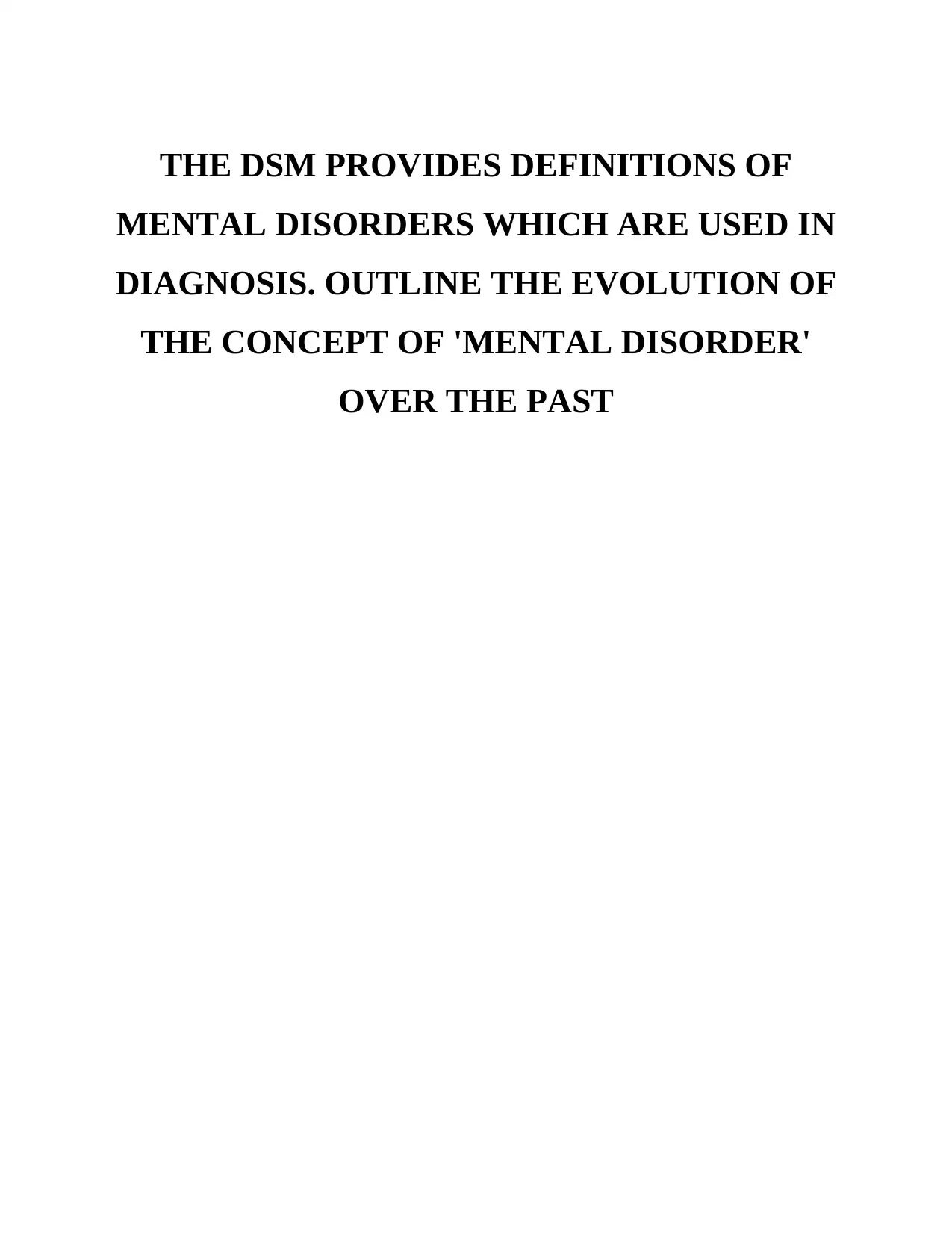
THE DSM PROVIDES DEFINITIONS OF
MENTAL DISORDERS WHICH ARE USED IN
DIAGNOSIS. OUTLINE THE EVOLUTION OF
THE CONCEPT OF 'MENTAL DISORDER'
OVER THE PAST
MENTAL DISORDERS WHICH ARE USED IN
DIAGNOSIS. OUTLINE THE EVOLUTION OF
THE CONCEPT OF 'MENTAL DISORDER'
OVER THE PAST
Paraphrase This Document
Need a fresh take? Get an instant paraphrase of this document with our AI Paraphraser

TABLE OF CONTENTS
MAIN BODY...................................................................................................................................3
REFERENCES................................................................................................................................1
MAIN BODY...................................................................................................................................3
REFERENCES................................................................................................................................1
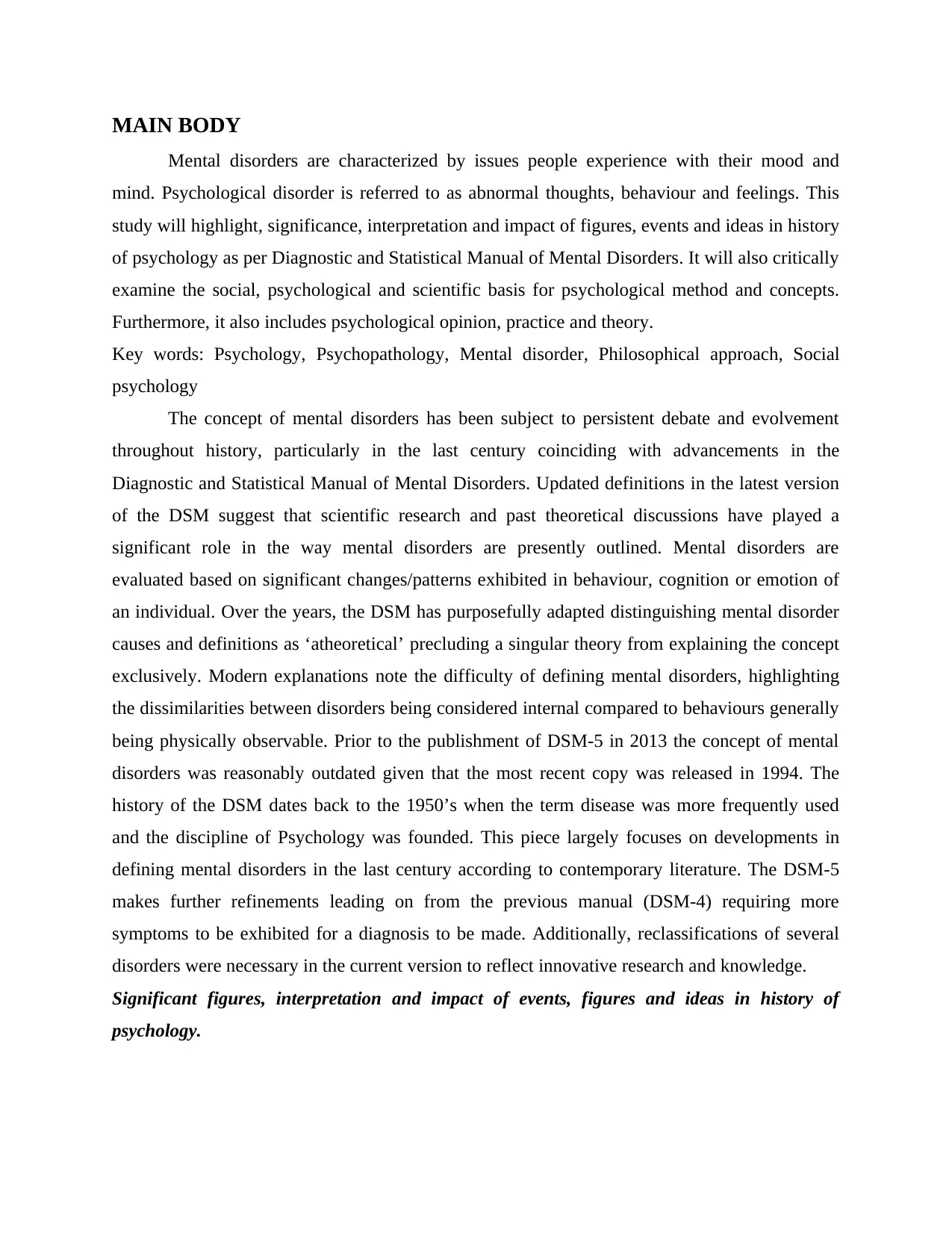
MAIN BODY
Mental disorders are characterized by issues people experience with their mood and
mind. Psychological disorder is referred to as abnormal thoughts, behaviour and feelings. This
study will highlight, significance, interpretation and impact of figures, events and ideas in history
of psychology as per Diagnostic and Statistical Manual of Mental Disorders. It will also critically
examine the social, psychological and scientific basis for psychological method and concepts.
Furthermore, it also includes psychological opinion, practice and theory.
Key words: Psychology, Psychopathology, Mental disorder, Philosophical approach, Social
psychology
The concept of mental disorders has been subject to persistent debate and evolvement
throughout history, particularly in the last century coinciding with advancements in the
Diagnostic and Statistical Manual of Mental Disorders. Updated definitions in the latest version
of the DSM suggest that scientific research and past theoretical discussions have played a
significant role in the way mental disorders are presently outlined. Mental disorders are
evaluated based on significant changes/patterns exhibited in behaviour, cognition or emotion of
an individual. Over the years, the DSM has purposefully adapted distinguishing mental disorder
causes and definitions as ‘atheoretical’ precluding a singular theory from explaining the concept
exclusively. Modern explanations note the difficulty of defining mental disorders, highlighting
the dissimilarities between disorders being considered internal compared to behaviours generally
being physically observable. Prior to the publishment of DSM-5 in 2013 the concept of mental
disorders was reasonably outdated given that the most recent copy was released in 1994. The
history of the DSM dates back to the 1950’s when the term disease was more frequently used
and the discipline of Psychology was founded. This piece largely focuses on developments in
defining mental disorders in the last century according to contemporary literature. The DSM-5
makes further refinements leading on from the previous manual (DSM-4) requiring more
symptoms to be exhibited for a diagnosis to be made. Additionally, reclassifications of several
disorders were necessary in the current version to reflect innovative research and knowledge.
Significant figures, interpretation and impact of events, figures and ideas in history of
psychology.
Mental disorders are characterized by issues people experience with their mood and
mind. Psychological disorder is referred to as abnormal thoughts, behaviour and feelings. This
study will highlight, significance, interpretation and impact of figures, events and ideas in history
of psychology as per Diagnostic and Statistical Manual of Mental Disorders. It will also critically
examine the social, psychological and scientific basis for psychological method and concepts.
Furthermore, it also includes psychological opinion, practice and theory.
Key words: Psychology, Psychopathology, Mental disorder, Philosophical approach, Social
psychology
The concept of mental disorders has been subject to persistent debate and evolvement
throughout history, particularly in the last century coinciding with advancements in the
Diagnostic and Statistical Manual of Mental Disorders. Updated definitions in the latest version
of the DSM suggest that scientific research and past theoretical discussions have played a
significant role in the way mental disorders are presently outlined. Mental disorders are
evaluated based on significant changes/patterns exhibited in behaviour, cognition or emotion of
an individual. Over the years, the DSM has purposefully adapted distinguishing mental disorder
causes and definitions as ‘atheoretical’ precluding a singular theory from explaining the concept
exclusively. Modern explanations note the difficulty of defining mental disorders, highlighting
the dissimilarities between disorders being considered internal compared to behaviours generally
being physically observable. Prior to the publishment of DSM-5 in 2013 the concept of mental
disorders was reasonably outdated given that the most recent copy was released in 1994. The
history of the DSM dates back to the 1950’s when the term disease was more frequently used
and the discipline of Psychology was founded. This piece largely focuses on developments in
defining mental disorders in the last century according to contemporary literature. The DSM-5
makes further refinements leading on from the previous manual (DSM-4) requiring more
symptoms to be exhibited for a diagnosis to be made. Additionally, reclassifications of several
disorders were necessary in the current version to reflect innovative research and knowledge.
Significant figures, interpretation and impact of events, figures and ideas in history of
psychology.
⊘ This is a preview!⊘
Do you want full access?
Subscribe today to unlock all pages.

Trusted by 1+ million students worldwide
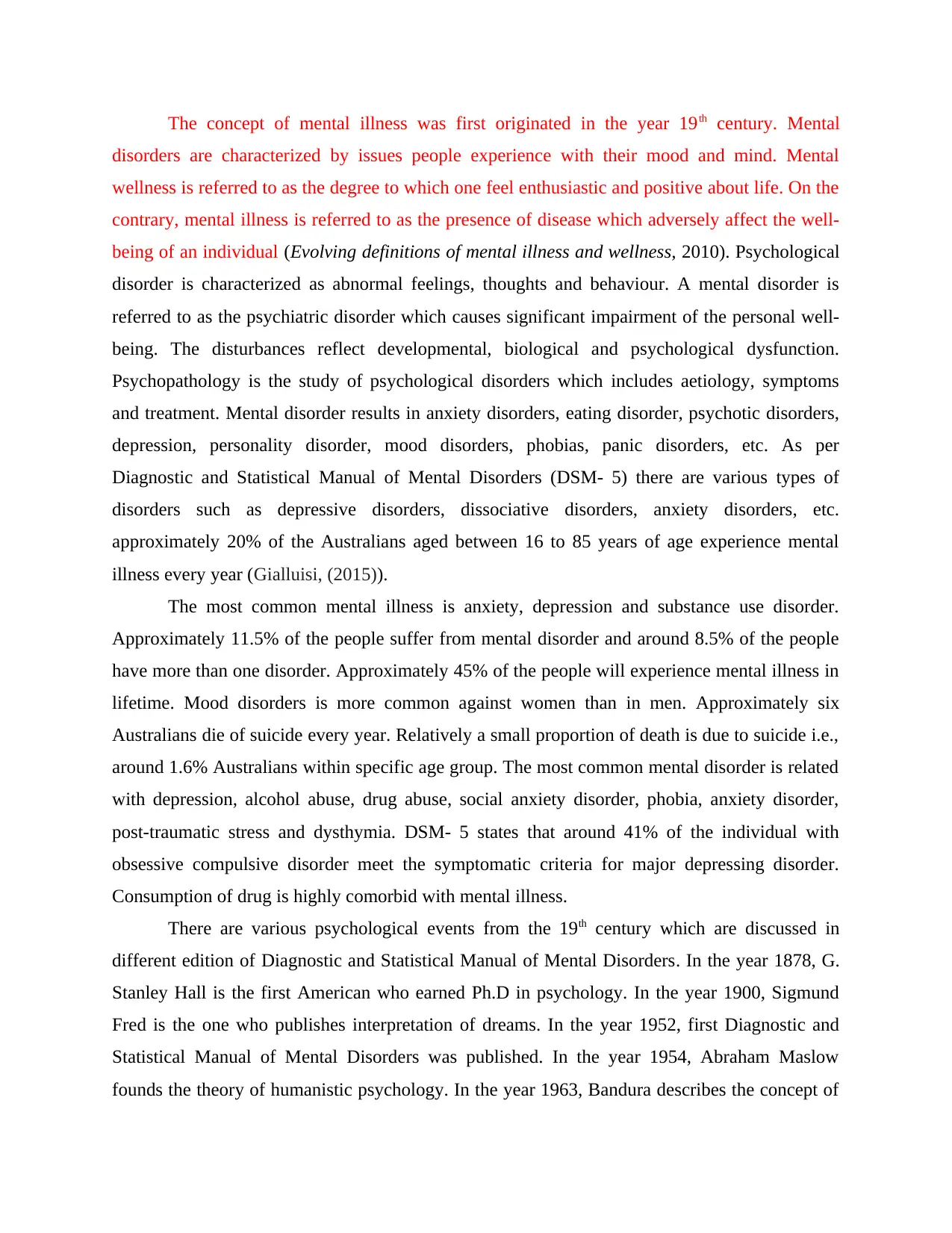
The concept of mental illness was first originated in the year 19th century. Mental
disorders are characterized by issues people experience with their mood and mind. Mental
wellness is referred to as the degree to which one feel enthusiastic and positive about life. On the
contrary, mental illness is referred to as the presence of disease which adversely affect the well-
being of an individual (Evolving definitions of mental illness and wellness, 2010). Psychological
disorder is characterized as abnormal feelings, thoughts and behaviour. A mental disorder is
referred to as the psychiatric disorder which causes significant impairment of the personal well-
being. The disturbances reflect developmental, biological and psychological dysfunction.
Psychopathology is the study of psychological disorders which includes aetiology, symptoms
and treatment. Mental disorder results in anxiety disorders, eating disorder, psychotic disorders,
depression, personality disorder, mood disorders, phobias, panic disorders, etc. As per
Diagnostic and Statistical Manual of Mental Disorders (DSM- 5) there are various types of
disorders such as depressive disorders, dissociative disorders, anxiety disorders, etc.
approximately 20% of the Australians aged between 16 to 85 years of age experience mental
illness every year (Gialluisi, (2015)).
The most common mental illness is anxiety, depression and substance use disorder.
Approximately 11.5% of the people suffer from mental disorder and around 8.5% of the people
have more than one disorder. Approximately 45% of the people will experience mental illness in
lifetime. Mood disorders is more common against women than in men. Approximately six
Australians die of suicide every year. Relatively a small proportion of death is due to suicide i.e.,
around 1.6% Australians within specific age group. The most common mental disorder is related
with depression, alcohol abuse, drug abuse, social anxiety disorder, phobia, anxiety disorder,
post-traumatic stress and dysthymia. DSM- 5 states that around 41% of the individual with
obsessive compulsive disorder meet the symptomatic criteria for major depressing disorder.
Consumption of drug is highly comorbid with mental illness.
There are various psychological events from the 19th century which are discussed in
different edition of Diagnostic and Statistical Manual of Mental Disorders. In the year 1878, G.
Stanley Hall is the first American who earned Ph.D in psychology. In the year 1900, Sigmund
Fred is the one who publishes interpretation of dreams. In the year 1952, first Diagnostic and
Statistical Manual of Mental Disorders was published. In the year 1954, Abraham Maslow
founds the theory of humanistic psychology. In the year 1963, Bandura describes the concept of
disorders are characterized by issues people experience with their mood and mind. Mental
wellness is referred to as the degree to which one feel enthusiastic and positive about life. On the
contrary, mental illness is referred to as the presence of disease which adversely affect the well-
being of an individual (Evolving definitions of mental illness and wellness, 2010). Psychological
disorder is characterized as abnormal feelings, thoughts and behaviour. A mental disorder is
referred to as the psychiatric disorder which causes significant impairment of the personal well-
being. The disturbances reflect developmental, biological and psychological dysfunction.
Psychopathology is the study of psychological disorders which includes aetiology, symptoms
and treatment. Mental disorder results in anxiety disorders, eating disorder, psychotic disorders,
depression, personality disorder, mood disorders, phobias, panic disorders, etc. As per
Diagnostic and Statistical Manual of Mental Disorders (DSM- 5) there are various types of
disorders such as depressive disorders, dissociative disorders, anxiety disorders, etc.
approximately 20% of the Australians aged between 16 to 85 years of age experience mental
illness every year (Gialluisi, (2015)).
The most common mental illness is anxiety, depression and substance use disorder.
Approximately 11.5% of the people suffer from mental disorder and around 8.5% of the people
have more than one disorder. Approximately 45% of the people will experience mental illness in
lifetime. Mood disorders is more common against women than in men. Approximately six
Australians die of suicide every year. Relatively a small proportion of death is due to suicide i.e.,
around 1.6% Australians within specific age group. The most common mental disorder is related
with depression, alcohol abuse, drug abuse, social anxiety disorder, phobia, anxiety disorder,
post-traumatic stress and dysthymia. DSM- 5 states that around 41% of the individual with
obsessive compulsive disorder meet the symptomatic criteria for major depressing disorder.
Consumption of drug is highly comorbid with mental illness.
There are various psychological events from the 19th century which are discussed in
different edition of Diagnostic and Statistical Manual of Mental Disorders. In the year 1878, G.
Stanley Hall is the first American who earned Ph.D in psychology. In the year 1900, Sigmund
Fred is the one who publishes interpretation of dreams. In the year 1952, first Diagnostic and
Statistical Manual of Mental Disorders was published. In the year 1954, Abraham Maslow
founds the theory of humanistic psychology. In the year 1963, Bandura describes the concept of
Paraphrase This Document
Need a fresh take? Get an instant paraphrase of this document with our AI Paraphraser
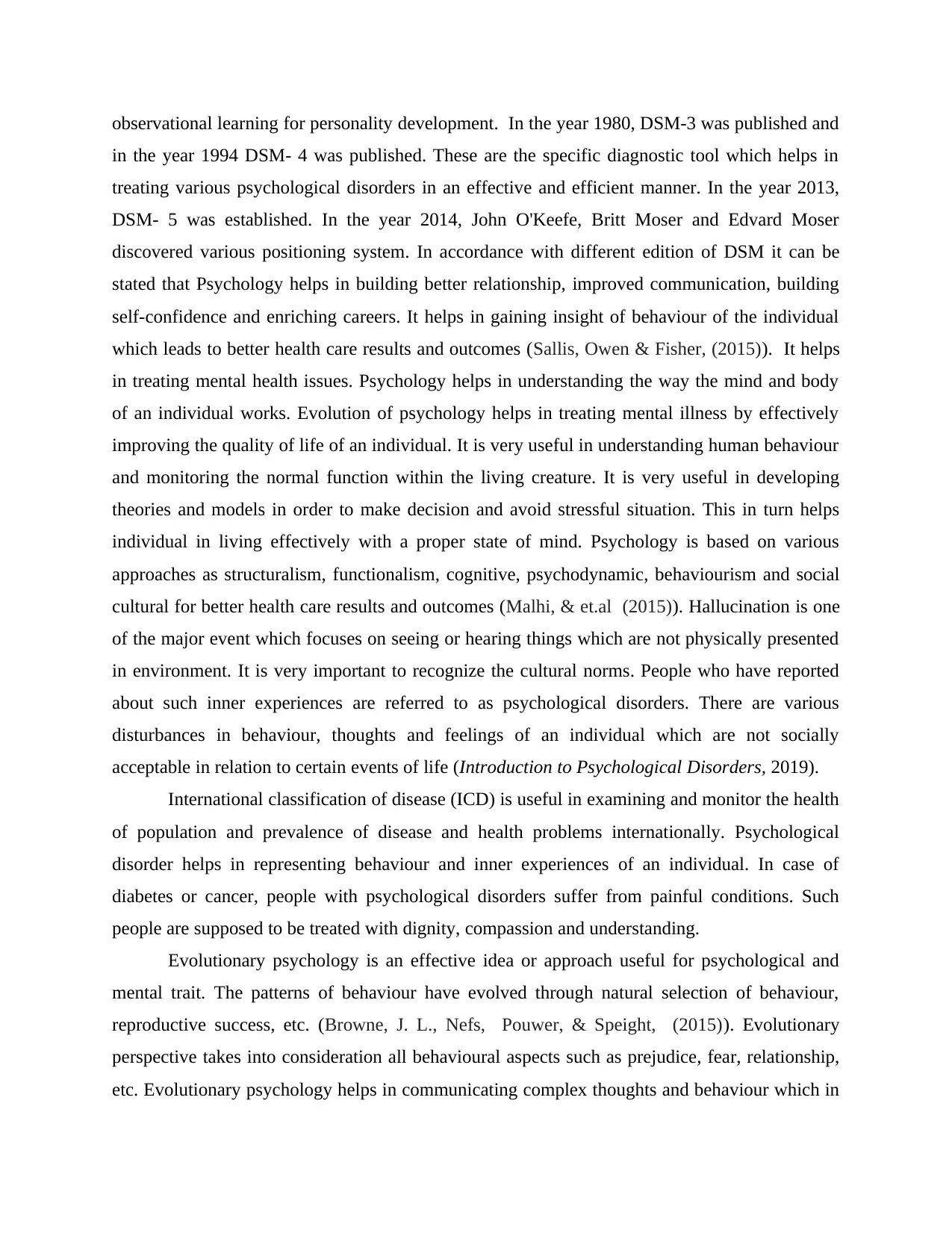
observational learning for personality development. In the year 1980, DSM-3 was published and
in the year 1994 DSM- 4 was published. These are the specific diagnostic tool which helps in
treating various psychological disorders in an effective and efficient manner. In the year 2013,
DSM- 5 was established. In the year 2014, John O'Keefe, Britt Moser and Edvard Moser
discovered various positioning system. In accordance with different edition of DSM it can be
stated that Psychology helps in building better relationship, improved communication, building
self-confidence and enriching careers. It helps in gaining insight of behaviour of the individual
which leads to better health care results and outcomes (Sallis, Owen & Fisher, (2015)). It helps
in treating mental health issues. Psychology helps in understanding the way the mind and body
of an individual works. Evolution of psychology helps in treating mental illness by effectively
improving the quality of life of an individual. It is very useful in understanding human behaviour
and monitoring the normal function within the living creature. It is very useful in developing
theories and models in order to make decision and avoid stressful situation. This in turn helps
individual in living effectively with a proper state of mind. Psychology is based on various
approaches as structuralism, functionalism, cognitive, psychodynamic, behaviourism and social
cultural for better health care results and outcomes (Malhi, & et.al (2015)). Hallucination is one
of the major event which focuses on seeing or hearing things which are not physically presented
in environment. It is very important to recognize the cultural norms. People who have reported
about such inner experiences are referred to as psychological disorders. There are various
disturbances in behaviour, thoughts and feelings of an individual which are not socially
acceptable in relation to certain events of life (Introduction to Psychological Disorders, 2019).
International classification of disease (ICD) is useful in examining and monitor the health
of population and prevalence of disease and health problems internationally. Psychological
disorder helps in representing behaviour and inner experiences of an individual. In case of
diabetes or cancer, people with psychological disorders suffer from painful conditions. Such
people are supposed to be treated with dignity, compassion and understanding.
Evolutionary psychology is an effective idea or approach useful for psychological and
mental trait. The patterns of behaviour have evolved through natural selection of behaviour,
reproductive success, etc. (Browne, J. L., Nefs, Pouwer, & Speight, (2015)). Evolutionary
perspective takes into consideration all behavioural aspects such as prejudice, fear, relationship,
etc. Evolutionary psychology helps in communicating complex thoughts and behaviour which in
in the year 1994 DSM- 4 was published. These are the specific diagnostic tool which helps in
treating various psychological disorders in an effective and efficient manner. In the year 2013,
DSM- 5 was established. In the year 2014, John O'Keefe, Britt Moser and Edvard Moser
discovered various positioning system. In accordance with different edition of DSM it can be
stated that Psychology helps in building better relationship, improved communication, building
self-confidence and enriching careers. It helps in gaining insight of behaviour of the individual
which leads to better health care results and outcomes (Sallis, Owen & Fisher, (2015)). It helps
in treating mental health issues. Psychology helps in understanding the way the mind and body
of an individual works. Evolution of psychology helps in treating mental illness by effectively
improving the quality of life of an individual. It is very useful in understanding human behaviour
and monitoring the normal function within the living creature. It is very useful in developing
theories and models in order to make decision and avoid stressful situation. This in turn helps
individual in living effectively with a proper state of mind. Psychology is based on various
approaches as structuralism, functionalism, cognitive, psychodynamic, behaviourism and social
cultural for better health care results and outcomes (Malhi, & et.al (2015)). Hallucination is one
of the major event which focuses on seeing or hearing things which are not physically presented
in environment. It is very important to recognize the cultural norms. People who have reported
about such inner experiences are referred to as psychological disorders. There are various
disturbances in behaviour, thoughts and feelings of an individual which are not socially
acceptable in relation to certain events of life (Introduction to Psychological Disorders, 2019).
International classification of disease (ICD) is useful in examining and monitor the health
of population and prevalence of disease and health problems internationally. Psychological
disorder helps in representing behaviour and inner experiences of an individual. In case of
diabetes or cancer, people with psychological disorders suffer from painful conditions. Such
people are supposed to be treated with dignity, compassion and understanding.
Evolutionary psychology is an effective idea or approach useful for psychological and
mental trait. The patterns of behaviour have evolved through natural selection of behaviour,
reproductive success, etc. (Browne, J. L., Nefs, Pouwer, & Speight, (2015)). Evolutionary
perspective takes into consideration all behavioural aspects such as prejudice, fear, relationship,
etc. Evolutionary psychology helps in communicating complex thoughts and behaviour which in
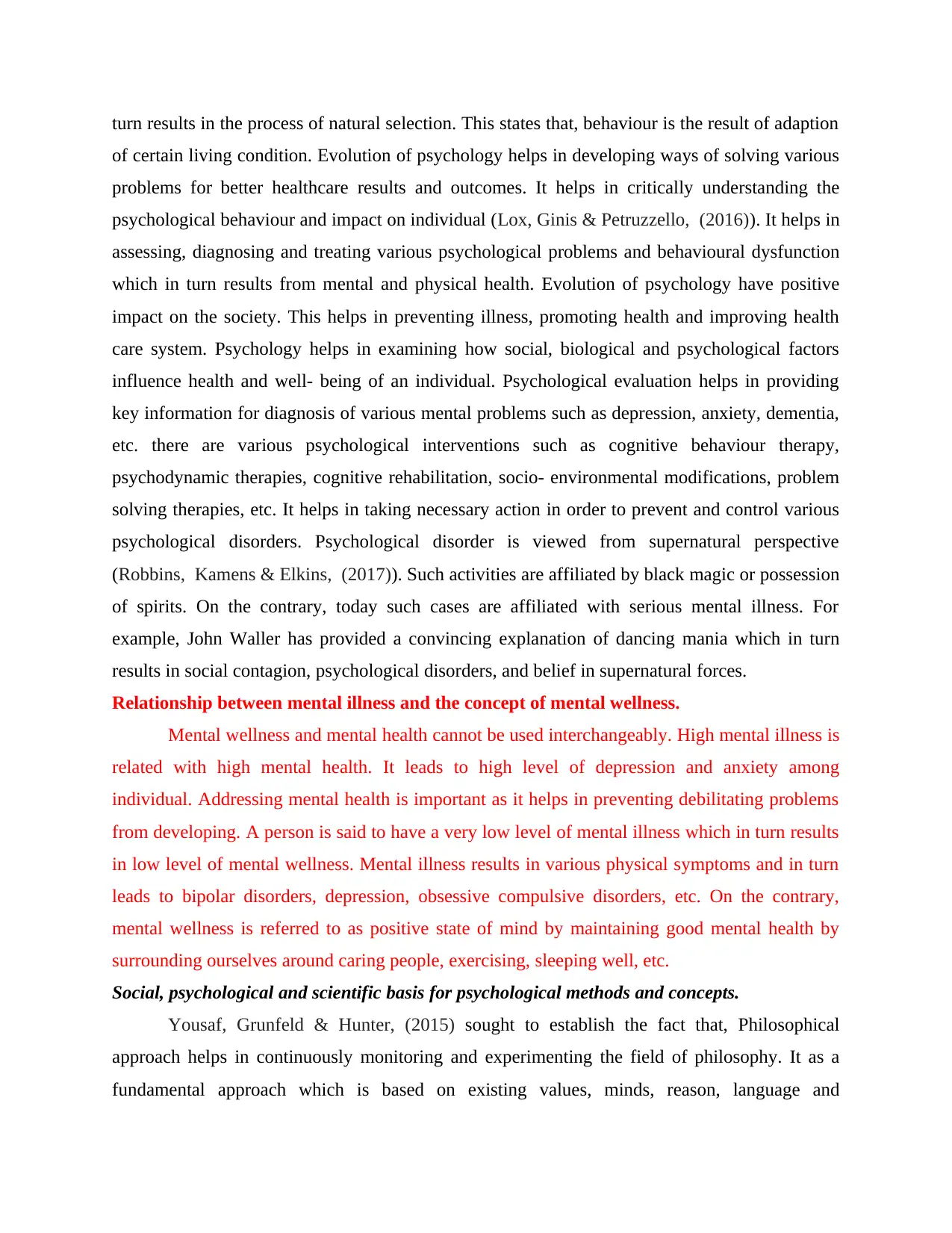
turn results in the process of natural selection. This states that, behaviour is the result of adaption
of certain living condition. Evolution of psychology helps in developing ways of solving various
problems for better healthcare results and outcomes. It helps in critically understanding the
psychological behaviour and impact on individual (Lox, Ginis & Petruzzello, (2016)). It helps in
assessing, diagnosing and treating various psychological problems and behavioural dysfunction
which in turn results from mental and physical health. Evolution of psychology have positive
impact on the society. This helps in preventing illness, promoting health and improving health
care system. Psychology helps in examining how social, biological and psychological factors
influence health and well- being of an individual. Psychological evaluation helps in providing
key information for diagnosis of various mental problems such as depression, anxiety, dementia,
etc. there are various psychological interventions such as cognitive behaviour therapy,
psychodynamic therapies, cognitive rehabilitation, socio- environmental modifications, problem
solving therapies, etc. It helps in taking necessary action in order to prevent and control various
psychological disorders. Psychological disorder is viewed from supernatural perspective
(Robbins, Kamens & Elkins, (2017)). Such activities are affiliated by black magic or possession
of spirits. On the contrary, today such cases are affiliated with serious mental illness. For
example, John Waller has provided a convincing explanation of dancing mania which in turn
results in social contagion, psychological disorders, and belief in supernatural forces.
Relationship between mental illness and the concept of mental wellness.
Mental wellness and mental health cannot be used interchangeably. High mental illness is
related with high mental health. It leads to high level of depression and anxiety among
individual. Addressing mental health is important as it helps in preventing debilitating problems
from developing. A person is said to have a very low level of mental illness which in turn results
in low level of mental wellness. Mental illness results in various physical symptoms and in turn
leads to bipolar disorders, depression, obsessive compulsive disorders, etc. On the contrary,
mental wellness is referred to as positive state of mind by maintaining good mental health by
surrounding ourselves around caring people, exercising, sleeping well, etc.
Social, psychological and scientific basis for psychological methods and concepts.
Yousaf, Grunfeld & Hunter, (2015) sought to establish the fact that, Philosophical
approach helps in continuously monitoring and experimenting the field of philosophy. It as a
fundamental approach which is based on existing values, minds, reason, language and
of certain living condition. Evolution of psychology helps in developing ways of solving various
problems for better healthcare results and outcomes. It helps in critically understanding the
psychological behaviour and impact on individual (Lox, Ginis & Petruzzello, (2016)). It helps in
assessing, diagnosing and treating various psychological problems and behavioural dysfunction
which in turn results from mental and physical health. Evolution of psychology have positive
impact on the society. This helps in preventing illness, promoting health and improving health
care system. Psychology helps in examining how social, biological and psychological factors
influence health and well- being of an individual. Psychological evaluation helps in providing
key information for diagnosis of various mental problems such as depression, anxiety, dementia,
etc. there are various psychological interventions such as cognitive behaviour therapy,
psychodynamic therapies, cognitive rehabilitation, socio- environmental modifications, problem
solving therapies, etc. It helps in taking necessary action in order to prevent and control various
psychological disorders. Psychological disorder is viewed from supernatural perspective
(Robbins, Kamens & Elkins, (2017)). Such activities are affiliated by black magic or possession
of spirits. On the contrary, today such cases are affiliated with serious mental illness. For
example, John Waller has provided a convincing explanation of dancing mania which in turn
results in social contagion, psychological disorders, and belief in supernatural forces.
Relationship between mental illness and the concept of mental wellness.
Mental wellness and mental health cannot be used interchangeably. High mental illness is
related with high mental health. It leads to high level of depression and anxiety among
individual. Addressing mental health is important as it helps in preventing debilitating problems
from developing. A person is said to have a very low level of mental illness which in turn results
in low level of mental wellness. Mental illness results in various physical symptoms and in turn
leads to bipolar disorders, depression, obsessive compulsive disorders, etc. On the contrary,
mental wellness is referred to as positive state of mind by maintaining good mental health by
surrounding ourselves around caring people, exercising, sleeping well, etc.
Social, psychological and scientific basis for psychological methods and concepts.
Yousaf, Grunfeld & Hunter, (2015) sought to establish the fact that, Philosophical
approach helps in continuously monitoring and experimenting the field of philosophy. It as a
fundamental approach which is based on existing values, minds, reason, language and
⊘ This is a preview!⊘
Do you want full access?
Subscribe today to unlock all pages.

Trusted by 1+ million students worldwide
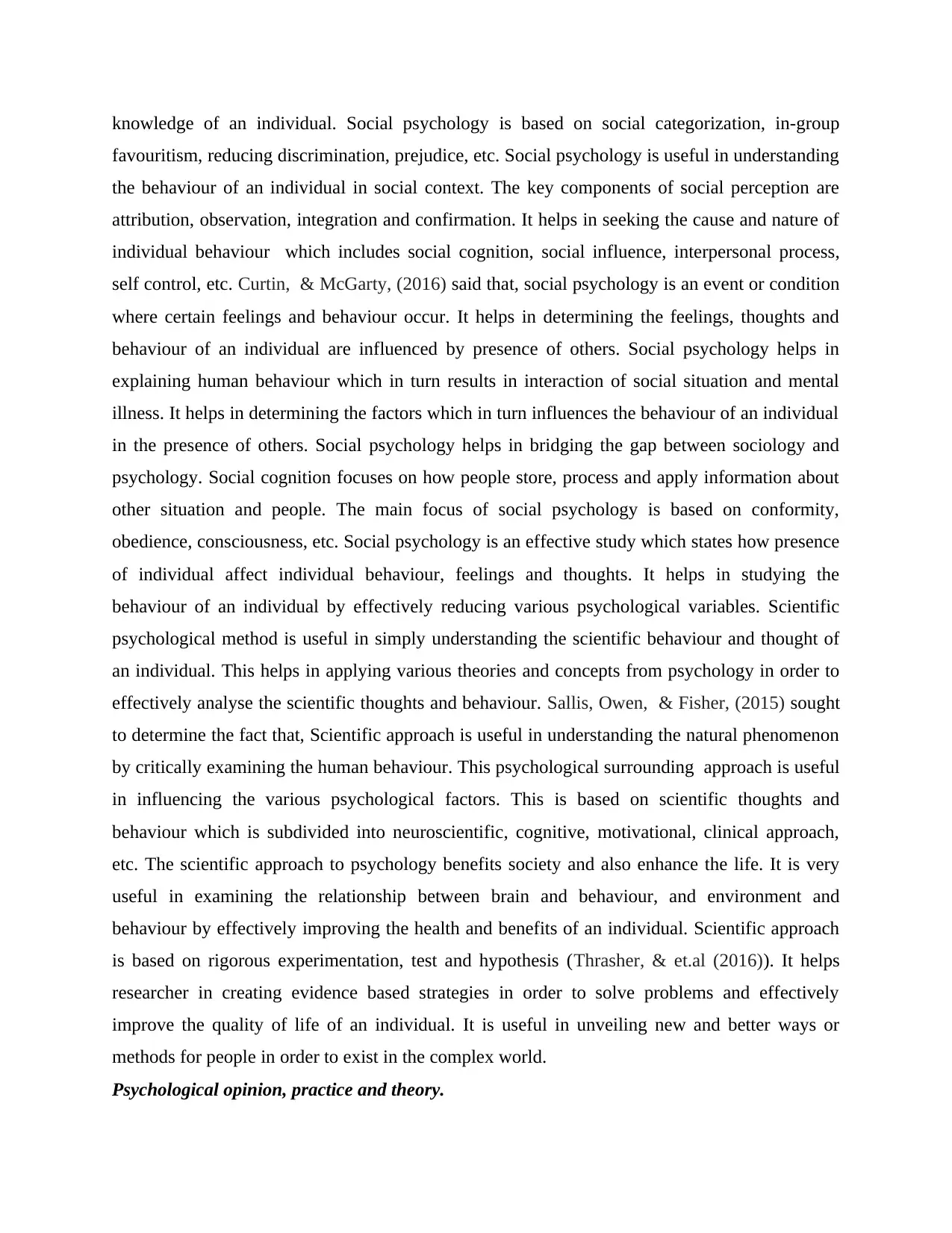
knowledge of an individual. Social psychology is based on social categorization, in-group
favouritism, reducing discrimination, prejudice, etc. Social psychology is useful in understanding
the behaviour of an individual in social context. The key components of social perception are
attribution, observation, integration and confirmation. It helps in seeking the cause and nature of
individual behaviour which includes social cognition, social influence, interpersonal process,
self control, etc. Curtin, & McGarty, (2016) said that, social psychology is an event or condition
where certain feelings and behaviour occur. It helps in determining the feelings, thoughts and
behaviour of an individual are influenced by presence of others. Social psychology helps in
explaining human behaviour which in turn results in interaction of social situation and mental
illness. It helps in determining the factors which in turn influences the behaviour of an individual
in the presence of others. Social psychology helps in bridging the gap between sociology and
psychology. Social cognition focuses on how people store, process and apply information about
other situation and people. The main focus of social psychology is based on conformity,
obedience, consciousness, etc. Social psychology is an effective study which states how presence
of individual affect individual behaviour, feelings and thoughts. It helps in studying the
behaviour of an individual by effectively reducing various psychological variables. Scientific
psychological method is useful in simply understanding the scientific behaviour and thought of
an individual. This helps in applying various theories and concepts from psychology in order to
effectively analyse the scientific thoughts and behaviour. Sallis, Owen, & Fisher, (2015) sought
to determine the fact that, Scientific approach is useful in understanding the natural phenomenon
by critically examining the human behaviour. This psychological surrounding approach is useful
in influencing the various psychological factors. This is based on scientific thoughts and
behaviour which is subdivided into neuroscientific, cognitive, motivational, clinical approach,
etc. The scientific approach to psychology benefits society and also enhance the life. It is very
useful in examining the relationship between brain and behaviour, and environment and
behaviour by effectively improving the health and benefits of an individual. Scientific approach
is based on rigorous experimentation, test and hypothesis (Thrasher, & et.al (2016)). It helps
researcher in creating evidence based strategies in order to solve problems and effectively
improve the quality of life of an individual. It is useful in unveiling new and better ways or
methods for people in order to exist in the complex world.
Psychological opinion, practice and theory.
favouritism, reducing discrimination, prejudice, etc. Social psychology is useful in understanding
the behaviour of an individual in social context. The key components of social perception are
attribution, observation, integration and confirmation. It helps in seeking the cause and nature of
individual behaviour which includes social cognition, social influence, interpersonal process,
self control, etc. Curtin, & McGarty, (2016) said that, social psychology is an event or condition
where certain feelings and behaviour occur. It helps in determining the feelings, thoughts and
behaviour of an individual are influenced by presence of others. Social psychology helps in
explaining human behaviour which in turn results in interaction of social situation and mental
illness. It helps in determining the factors which in turn influences the behaviour of an individual
in the presence of others. Social psychology helps in bridging the gap between sociology and
psychology. Social cognition focuses on how people store, process and apply information about
other situation and people. The main focus of social psychology is based on conformity,
obedience, consciousness, etc. Social psychology is an effective study which states how presence
of individual affect individual behaviour, feelings and thoughts. It helps in studying the
behaviour of an individual by effectively reducing various psychological variables. Scientific
psychological method is useful in simply understanding the scientific behaviour and thought of
an individual. This helps in applying various theories and concepts from psychology in order to
effectively analyse the scientific thoughts and behaviour. Sallis, Owen, & Fisher, (2015) sought
to determine the fact that, Scientific approach is useful in understanding the natural phenomenon
by critically examining the human behaviour. This psychological surrounding approach is useful
in influencing the various psychological factors. This is based on scientific thoughts and
behaviour which is subdivided into neuroscientific, cognitive, motivational, clinical approach,
etc. The scientific approach to psychology benefits society and also enhance the life. It is very
useful in examining the relationship between brain and behaviour, and environment and
behaviour by effectively improving the health and benefits of an individual. Scientific approach
is based on rigorous experimentation, test and hypothesis (Thrasher, & et.al (2016)). It helps
researcher in creating evidence based strategies in order to solve problems and effectively
improve the quality of life of an individual. It is useful in unveiling new and better ways or
methods for people in order to exist in the complex world.
Psychological opinion, practice and theory.
Paraphrase This Document
Need a fresh take? Get an instant paraphrase of this document with our AI Paraphraser
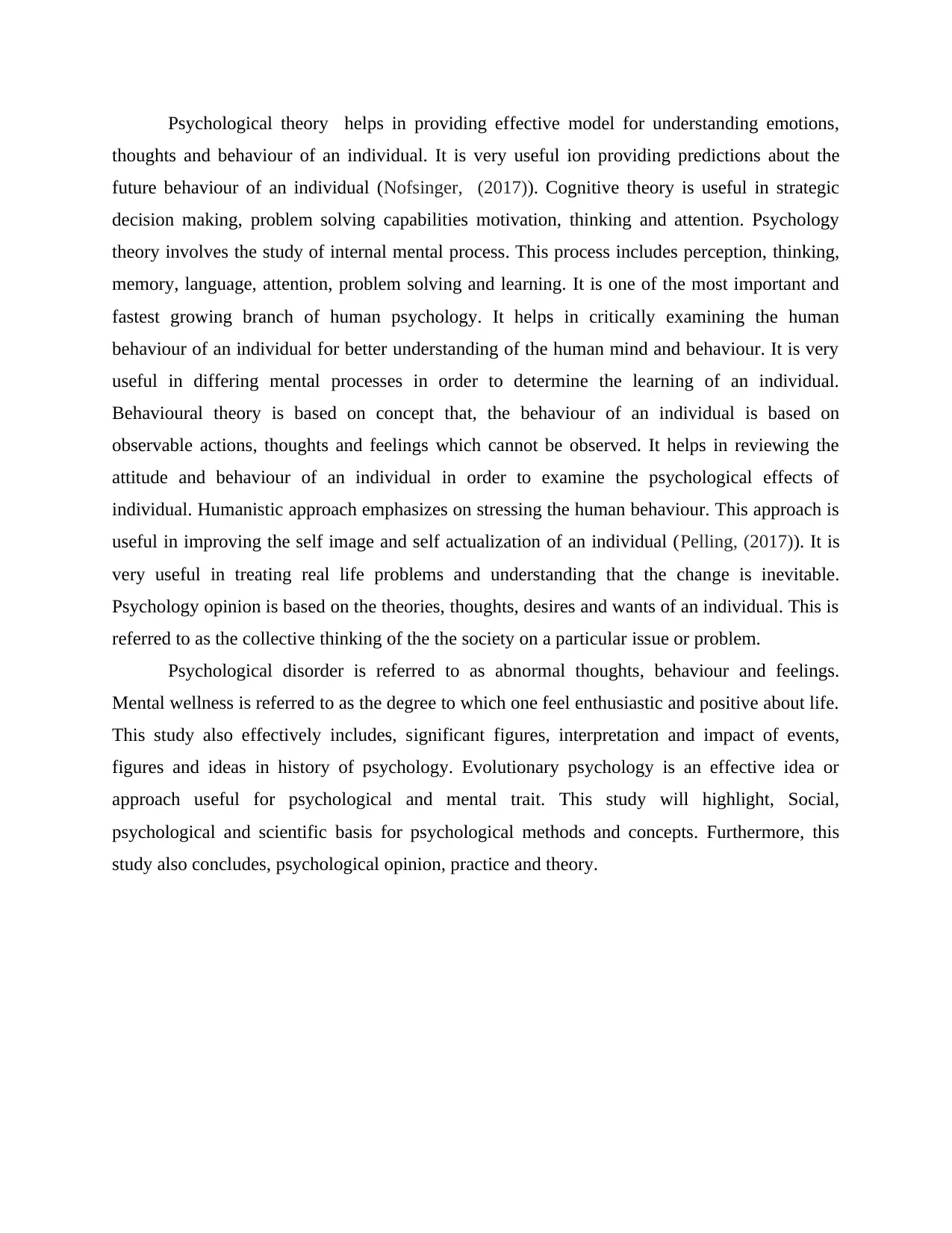
Psychological theory helps in providing effective model for understanding emotions,
thoughts and behaviour of an individual. It is very useful ion providing predictions about the
future behaviour of an individual (Nofsinger, (2017)). Cognitive theory is useful in strategic
decision making, problem solving capabilities motivation, thinking and attention. Psychology
theory involves the study of internal mental process. This process includes perception, thinking,
memory, language, attention, problem solving and learning. It is one of the most important and
fastest growing branch of human psychology. It helps in critically examining the human
behaviour of an individual for better understanding of the human mind and behaviour. It is very
useful in differing mental processes in order to determine the learning of an individual.
Behavioural theory is based on concept that, the behaviour of an individual is based on
observable actions, thoughts and feelings which cannot be observed. It helps in reviewing the
attitude and behaviour of an individual in order to examine the psychological effects of
individual. Humanistic approach emphasizes on stressing the human behaviour. This approach is
useful in improving the self image and self actualization of an individual (Pelling, (2017)). It is
very useful in treating real life problems and understanding that the change is inevitable.
Psychology opinion is based on the theories, thoughts, desires and wants of an individual. This is
referred to as the collective thinking of the the society on a particular issue or problem.
Psychological disorder is referred to as abnormal thoughts, behaviour and feelings.
Mental wellness is referred to as the degree to which one feel enthusiastic and positive about life.
This study also effectively includes, significant figures, interpretation and impact of events,
figures and ideas in history of psychology. Evolutionary psychology is an effective idea or
approach useful for psychological and mental trait. This study will highlight, Social,
psychological and scientific basis for psychological methods and concepts. Furthermore, this
study also concludes, psychological opinion, practice and theory.
thoughts and behaviour of an individual. It is very useful ion providing predictions about the
future behaviour of an individual (Nofsinger, (2017)). Cognitive theory is useful in strategic
decision making, problem solving capabilities motivation, thinking and attention. Psychology
theory involves the study of internal mental process. This process includes perception, thinking,
memory, language, attention, problem solving and learning. It is one of the most important and
fastest growing branch of human psychology. It helps in critically examining the human
behaviour of an individual for better understanding of the human mind and behaviour. It is very
useful in differing mental processes in order to determine the learning of an individual.
Behavioural theory is based on concept that, the behaviour of an individual is based on
observable actions, thoughts and feelings which cannot be observed. It helps in reviewing the
attitude and behaviour of an individual in order to examine the psychological effects of
individual. Humanistic approach emphasizes on stressing the human behaviour. This approach is
useful in improving the self image and self actualization of an individual (Pelling, (2017)). It is
very useful in treating real life problems and understanding that the change is inevitable.
Psychology opinion is based on the theories, thoughts, desires and wants of an individual. This is
referred to as the collective thinking of the the society on a particular issue or problem.
Psychological disorder is referred to as abnormal thoughts, behaviour and feelings.
Mental wellness is referred to as the degree to which one feel enthusiastic and positive about life.
This study also effectively includes, significant figures, interpretation and impact of events,
figures and ideas in history of psychology. Evolutionary psychology is an effective idea or
approach useful for psychological and mental trait. This study will highlight, Social,
psychological and scientific basis for psychological methods and concepts. Furthermore, this
study also concludes, psychological opinion, practice and theory.
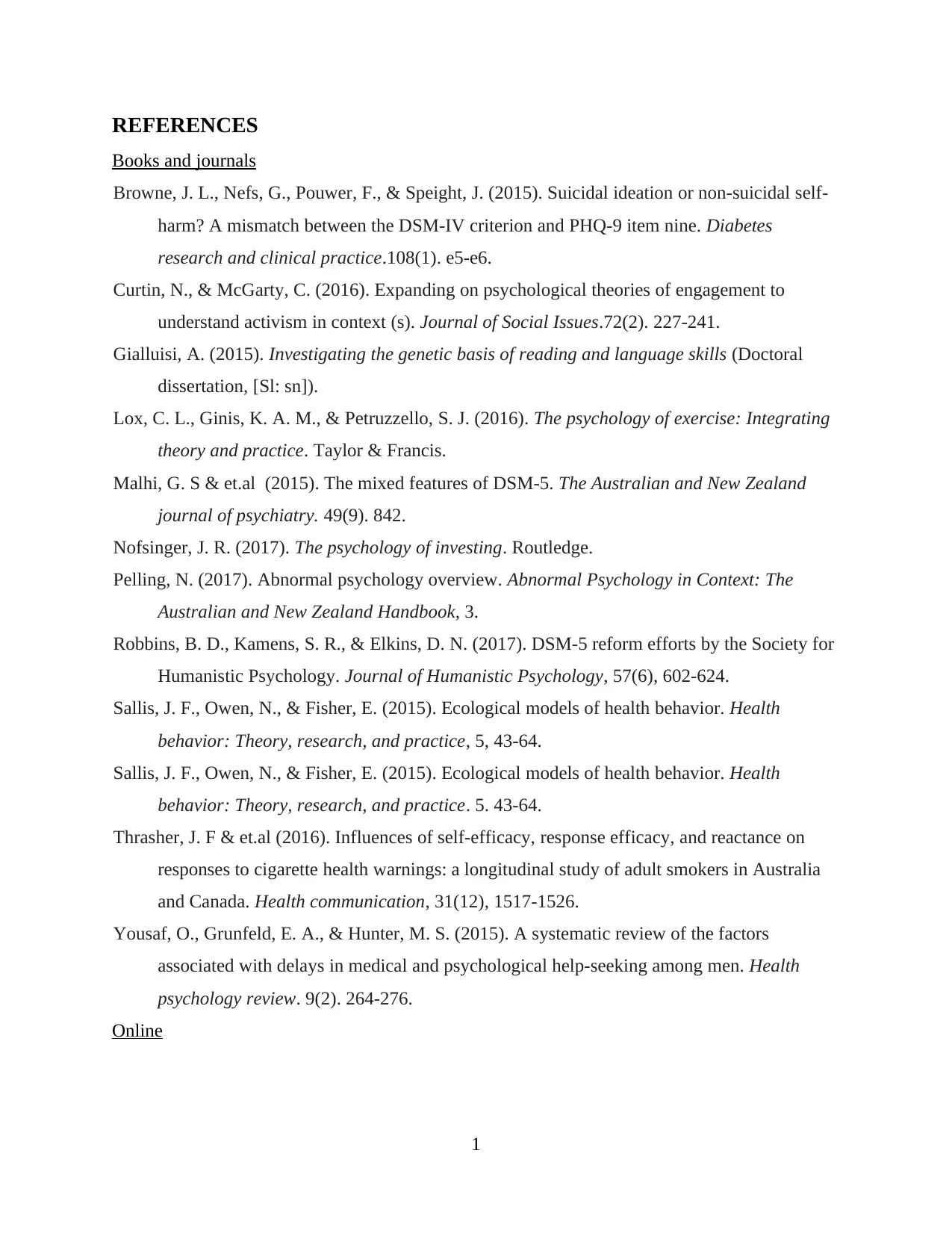
REFERENCES
Books and journals
Browne, J. L., Nefs, G., Pouwer, F., & Speight, J. (2015). Suicidal ideation or non-suicidal self-
harm? A mismatch between the DSM-IV criterion and PHQ-9 item nine. Diabetes
research and clinical practice.108(1). e5-e6.
Curtin, N., & McGarty, C. (2016). Expanding on psychological theories of engagement to
understand activism in context (s). Journal of Social Issues.72(2). 227-241.
Gialluisi, A. (2015). Investigating the genetic basis of reading and language skills (Doctoral
dissertation, [Sl: sn]).
Lox, C. L., Ginis, K. A. M., & Petruzzello, S. J. (2016). The psychology of exercise: Integrating
theory and practice. Taylor & Francis.
Malhi, G. S & et.al (2015). The mixed features of DSM-5. The Australian and New Zealand
journal of psychiatry. 49(9). 842.
Nofsinger, J. R. (2017). The psychology of investing. Routledge.
Pelling, N. (2017). Abnormal psychology overview. Abnormal Psychology in Context: The
Australian and New Zealand Handbook, 3.
Robbins, B. D., Kamens, S. R., & Elkins, D. N. (2017). DSM-5 reform efforts by the Society for
Humanistic Psychology. Journal of Humanistic Psychology, 57(6), 602-624.
Sallis, J. F., Owen, N., & Fisher, E. (2015). Ecological models of health behavior. Health
behavior: Theory, research, and practice, 5, 43-64.
Sallis, J. F., Owen, N., & Fisher, E. (2015). Ecological models of health behavior. Health
behavior: Theory, research, and practice. 5. 43-64.
Thrasher, J. F & et.al (2016). Influences of self-efficacy, response efficacy, and reactance on
responses to cigarette health warnings: a longitudinal study of adult smokers in Australia
and Canada. Health communication, 31(12), 1517-1526.
Yousaf, O., Grunfeld, E. A., & Hunter, M. S. (2015). A systematic review of the factors
associated with delays in medical and psychological help-seeking among men. Health
psychology review. 9(2). 264-276.
Online
1
Books and journals
Browne, J. L., Nefs, G., Pouwer, F., & Speight, J. (2015). Suicidal ideation or non-suicidal self-
harm? A mismatch between the DSM-IV criterion and PHQ-9 item nine. Diabetes
research and clinical practice.108(1). e5-e6.
Curtin, N., & McGarty, C. (2016). Expanding on psychological theories of engagement to
understand activism in context (s). Journal of Social Issues.72(2). 227-241.
Gialluisi, A. (2015). Investigating the genetic basis of reading and language skills (Doctoral
dissertation, [Sl: sn]).
Lox, C. L., Ginis, K. A. M., & Petruzzello, S. J. (2016). The psychology of exercise: Integrating
theory and practice. Taylor & Francis.
Malhi, G. S & et.al (2015). The mixed features of DSM-5. The Australian and New Zealand
journal of psychiatry. 49(9). 842.
Nofsinger, J. R. (2017). The psychology of investing. Routledge.
Pelling, N. (2017). Abnormal psychology overview. Abnormal Psychology in Context: The
Australian and New Zealand Handbook, 3.
Robbins, B. D., Kamens, S. R., & Elkins, D. N. (2017). DSM-5 reform efforts by the Society for
Humanistic Psychology. Journal of Humanistic Psychology, 57(6), 602-624.
Sallis, J. F., Owen, N., & Fisher, E. (2015). Ecological models of health behavior. Health
behavior: Theory, research, and practice, 5, 43-64.
Sallis, J. F., Owen, N., & Fisher, E. (2015). Ecological models of health behavior. Health
behavior: Theory, research, and practice. 5. 43-64.
Thrasher, J. F & et.al (2016). Influences of self-efficacy, response efficacy, and reactance on
responses to cigarette health warnings: a longitudinal study of adult smokers in Australia
and Canada. Health communication, 31(12), 1517-1526.
Yousaf, O., Grunfeld, E. A., & Hunter, M. S. (2015). A systematic review of the factors
associated with delays in medical and psychological help-seeking among men. Health
psychology review. 9(2). 264-276.
Online
1
⊘ This is a preview!⊘
Do you want full access?
Subscribe today to unlock all pages.

Trusted by 1+ million students worldwide
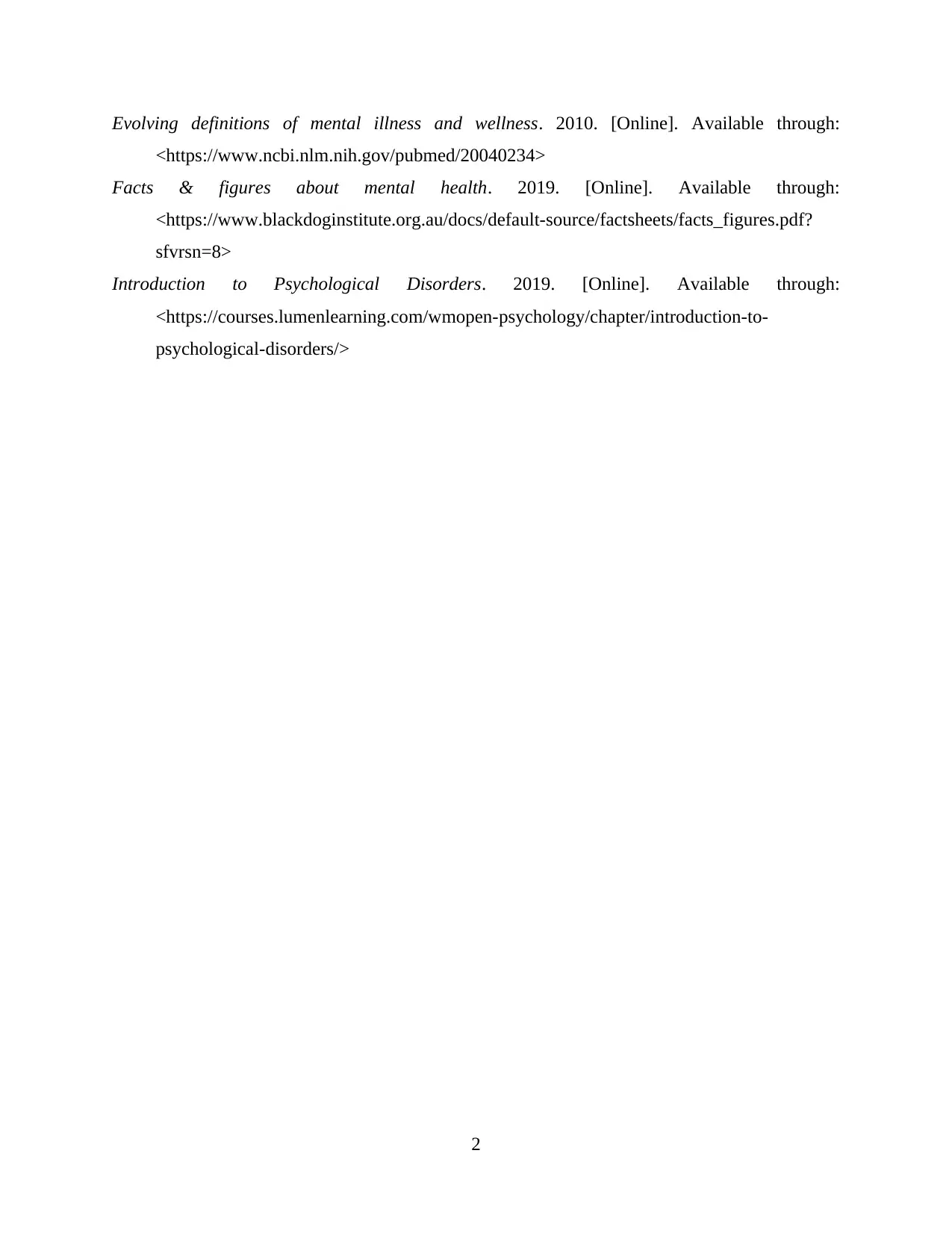
Evolving definitions of mental illness and wellness. 2010. [Online]. Available through:
<https://www.ncbi.nlm.nih.gov/pubmed/20040234>
Facts & figures about mental health. 2019. [Online]. Available through:
<https://www.blackdoginstitute.org.au/docs/default-source/factsheets/facts_figures.pdf?
sfvrsn=8>
Introduction to Psychological Disorders. 2019. [Online]. Available through:
<https://courses.lumenlearning.com/wmopen-psychology/chapter/introduction-to-
psychological-disorders/>
2
<https://www.ncbi.nlm.nih.gov/pubmed/20040234>
Facts & figures about mental health. 2019. [Online]. Available through:
<https://www.blackdoginstitute.org.au/docs/default-source/factsheets/facts_figures.pdf?
sfvrsn=8>
Introduction to Psychological Disorders. 2019. [Online]. Available through:
<https://courses.lumenlearning.com/wmopen-psychology/chapter/introduction-to-
psychological-disorders/>
2
1 out of 10
Related Documents
Your All-in-One AI-Powered Toolkit for Academic Success.
+13062052269
info@desklib.com
Available 24*7 on WhatsApp / Email
![[object Object]](/_next/static/media/star-bottom.7253800d.svg)
Unlock your academic potential
Copyright © 2020–2025 A2Z Services. All Rights Reserved. Developed and managed by ZUCOL.





